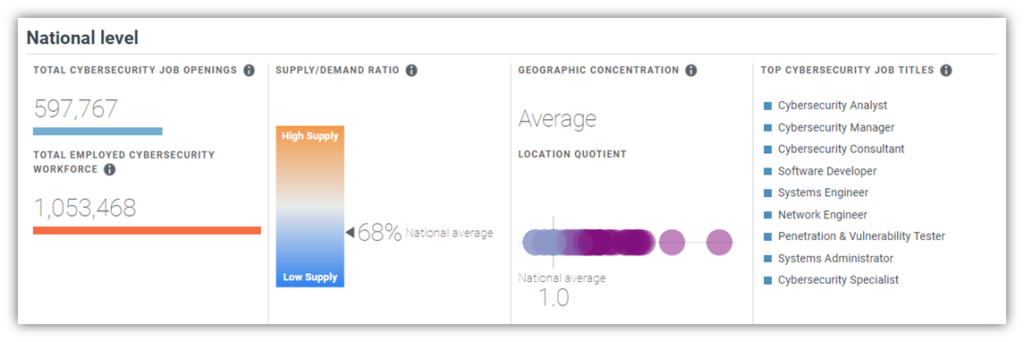Is Cybersecurity a Good Career? Insights from 8 Industry Experts
Which personality traits are dealmakers or dealbreakers in security professions? When should you avoid it as a career choice? Is working in cybersecurity boring? Let’s find out what the experts have to say!
When asked to summarize a career in cybersecurity, people often use one of two phrases – “high market demand” and “attractive compensation.” Cyberseek reports nearly 600,000 cybersecurity job vacancies in the United States alone as of September 2021, and 76% of organizations admit that they struggle to find and retain cybersecurity staff. With this in mind, having the right cybersecurity skills helps to ensure you’ll be in high demand in the job market.
But there’s always more to a good profession than job vacancies. So, we must look at other aspects of the field to answer the question, “is cybersecurity a good career?” After all, we might joke about the Monday blues, but we all want a satisfying job that matches our individual personalities and interests.
In this article, we explore five important aspects of cybersecurity careers that are drawn from interviews with eight cybersecurity experts. We also answer the question, “is cybersecurity boring?” You’ll find the experts’ responses in the next section. We hope that this exploration will help you to decide whether cybersecurity is a good career path for you or not.
Is Cybersecurity a Good Career? A Look at the Good and Bad Aspects of This Field
The short answer to this question is “it depends.” The growing demand for security professionals and strikingly high salaries in the industry undoubtedly make it an attractive career choice. After all, existing cyber security professionals within the U.S. are available to fill only 68% of the jobs that employers are seeking professionals for. That’s a significant disparity between supply and demand in terms of cybersecurity career opportunities.

However, there are several other key aspects that you shouldn’t overlook. After interviewing many cybersecurity experts, we concluded that cybersecurity is a good career if you embody several key traits. Let’s explore each of these points more closely to determine what makes a cyber security career a good option.
1. You Need Have a Love for Learning and Continued Professional Growth
The cybersecurity field is constantly evolving. To succeed, you’ll need to keep up with new technologies, tools, and techniques. That means endless learning opportunities. So, if you don’t enjoy learning, you’ll likely to get frustrated quickly. If you’ve never liked studying and can’t wait to get your degree/certificate finished, you should be cautious about cybersecurity as a career choice. That “no more studying” phase never arrives!
As an IT security or cyber security professional, you’ll need to keep an eye on the latest developments in the industry, new types of cyber attacks, and methods to combat them. Updating your client’s security defenses accordingly is essential. If you can’t keep up with ever-changing technology, you’ll lag behind, and your outdated knowledge could cause devastating damage for your clients and their customers. (Furthermore, relying on outdated knowledge and skills can also cost you your job!)
Although keeping up with new trends is a part of all professions, the pace of change in cybersecurity is rapid. It can happen that with increased responsibilities, like caring for children or other family members, keeping up with the pace and upgrading skills can be a challenge – so, bear this in mind.
2. You Have to Work Well Under Pressure
As a part of your job, you’ll be dealing with angry and frustrated managers and business owners who are worried and scared for their businesses. Your ability to keep calm, detect problems, and mitigate attacks without losing your mind will be vital in your role.
Being able to quickly recognize and respond to information security threats is a great trait to have as cybercriminals are increasingly adept, nimble, and agile in their attacks. With new threats appearing all the time, showing pro-active, preventative, and responsive thinking is essential. You’ll need to be both level-headed and flexible because new threats and attacks can come from all directions, including within the target organization itself. As such, you’ll be expected to deal with these threats swiftly, which might be challenging and frustrating at times.
A cyber security career may not be your calling if you:
- Get stressed out easily in unpredictable situations,
- Don’t like to work under pressure, or
- Struggle to stay focused when surrounded by anxious people.
The above points are particularly relevant to high-level positions like chief information security officer (CISO) and chief security officer (CSO).
3. You Have to Be Meticulous and Diligent
A role in cybersecurity means that you’ll have access to your organization’s and clients’ most sensitive data and systems. They need to be able to trust your judgment and diligence. There is no scope for negligence; you must be meticulous and keep a keen eye on all the logs, networks, endpoints, and clouds. It’s all about crossing your T’s and dotting your I’s.
If you miss even a single unusual occurrence, vulnerability, or misconfiguration, the results can be grave. Hence, attention to detail and the ability to keep a keen eye on multiple systems simultaneously is a highly important skill to succeed in this field.
4. You Need to Be Able to Think Outside the Box
If you’re a penetration tester or threat hunter, you have to step into hackers’ shoes and figure out how they’ll try to defeat the existing security infrastructure. To create a strong security landscape and mitigate risks, you’ll need to be ahead of the hackers. You’ll regularly face new types of hacking tools and techniques, phishing scams, and malicious codes and will need to be able to predict them and build your defenses accordingly to stop them.
This means employing creative thinking. If you’re an out-of-the-box thinker, cybersecurity could be a good career choice for you. If unexpected things frustrate you or you find it hard to roll with the punches this might not be your ideal field.
5. Work-Life Balance Can Be an Issue
The cybersecurity field has many career paths and roles. While some jobs, like penetration tester, threat hunter, and security analyst can have a relatively normal work-life balance, the same cannot be said for roles like CISO/CSOs, independent security consultants, or digital forensic specialists. Much like doctors, they have to be prepared to work whenever a threat appears. In these roles, you’ll need to be ready to investigate and take immediate steps to mitigate attacks as soon as you become aware of them.
Data from Nominet’s cyber security survey shows that most CISOs work well over their contracted hours — by around 10 hours a week on average. Additionally:
- 88% of CISOs who responded to the survey reported that they constantly feel “moderately or tremendously stressed,” and
- 48% say the work stress they experience impacts their mental health.
If you’re someone who wants a laid-back work-life, you need to choose your role in cybersecurity very carefully. As you move to higher levels in this field, the work-life balance may be difficult to achieve.
Note of appreciation: We’d like to thank the following experts for providing their valuable opinions, which helped us compile the list above:
- Nikola Mladenovic, a cybersecurity consultant at VPN Brains,
- David Lukić, information security and compliance consultant at IDStrong,
- Patrick Smith, cybersecurity expert at Firesticktricks, and
- Mark Darby, cybersecurity expert and CEO at ISMS.online.
Is Cybersecurity Boring? No Way (At Least, Once You’re Past Entry Level Jobs…)
The next way to answer the question “is cybersecurity a good career?” is to explore whether it’s mentally stimulating job. Most of the security experts we talked said that they don’t get bored in their roles in cybersecurity. The field is highly dynamic; every day presents a different scenario with new riddles to solve.
Furthermore, cybercriminals are constantly developing innovative ways to break into systems and hack people. Hence, cybersecurity professionals get the chance to be equally or more creative in their approach to all the following:
- Defend the security landscape,
- Mitigate attacks, and
- Perform damage control after an attack.
With all of this in mind, we asked several cyber security experts whether they think cyber security careers are boring. Let’s explore what our four additional cybersecurity experts have to say.
Isla Sibanda, cybersecurity specialistand entrepreneur at Privacy Australia, warned us that entry-level cybersecurity jobs could be boring due to performing many repetitive tasks. Thankfully, the field becomes more interesting with career development:
“Lower-level cyber security professions are, on the whole, quite uninteresting because they can be rather tedious and repetitive. Where the same duties, such as running through checklists and reviewing logs, are repeated as part of daily activity.
Higher-level professions, on the other hand, necessitate a greater level of interest and problem-solving skills, making them more fascinating and fulfilling. I’ve never been bored because there is such a wide range of practice that is always changing.”
Harman Singh, founder of cybersecurity startup Cyphere, was amused when we asked him the same question. He provided the following insight:
“I do not think even one reason how this job can be boring. My advice to those feeling bored would be to do an inner inspection on what is their liking, what makes their job side boring and how best they can grow out of it — sometimes it’s one’s decision not to learn or grow further, or resistance to change that is the catalyst to stagnation, you can’t fault the entire domain for this though. A change in perspective, keenness to learn and grow can show you the other side of this.”
Hassan Usmani, a tech expert at YEELIGHT, also believes cybersecurity is an exciting career choice because each scenario is a new puzzle to solve and a new opportunity to raise your standards. He says:
“We rely on some tried-and-true concepts in cybersecurity, but strategies can vary on a daily basis. And there is always a fresh riddle to be solved. New threats emerge with each new wave of technology. It is the responsibility of security professionals to detect, comprehend, and mitigate these dangers. That changes dramatically when comparing how to defend a cloud-based website to defending a pacemaker in an old patient.”
Daniel Carter from Skuuudle says he also believes that cybersecurity is not boring due to the range of technology and scenarios that security professionals deal with every day:
“Security professionals have the opportunity to work directly with teams on technologies and systems they could never have imagined. The diversity is nearly unlimited, ranging from robots to automobiles to websites serving millions upon millions of users. That’s an exciting career opportunity. You’re not going to use the word ‘bored’ very often.”
Final Words on Whether Cybersecurity Is a Good Career
We all love great pay and being in demand in the job market. But what if, after landing a good job with an attractive package, you realize that you don’t like the work? Will every day become a struggle? After all, it’s often not easy to change careers after investing so much time, effort, and money in degrees and certifications. That’s why we’ve written this article to help aspiring cybersecurity experts make a well-informed decision before taking the plunge.
As we’ve discovered, a cyber security career can be an excellent choice if you:
- Love ongoing learning,
- Possess the ability to work under pressure,
- Are both meticulous and detail-oriented in your work,
- Are a creative thinker, and
- Can handle a challenging work-life balance.
According to our experts, if you check all of these boxes, you’re unlikely to get bored and will likely find cyber security as both an interesting and rewarding career!





















2018 Top 100 Ecommerce Retailers Benchmark Study
in Web Security5 Ridiculous (But Real) Reasons IoT Security is Critical
in IoTComodo CA is now Sectigo: FAQs
in SectigoStore8 Crucial Tips To Secure Your WordPress Website
in WordPress SecurityWhat is Always on SSL (AOSSL) and Why Do All Websites Need It?
in Encryption Web SecurityHow to Install SSL Certificates on WordPress: The Ultimate Migration Guide
in Encryption Web Security WordPress SecurityThe 7 Biggest Data Breaches of All Time
in Web SecurityHashing vs Encryption — The Big Players of the Cyber Security World
in EncryptionHow to Tell If a Website is Legit in 10 Easy Steps
in Web SecurityWhat Is OWASP? What Are the OWASP Top 10 Vulnerabilities?
in Web Security